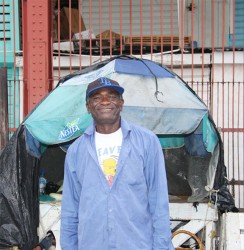A vigorous regime of trading ensues in the dead of night right here in the capital. While the city sleeps, farmers from across the country congregate on a stretch of tarmac behind the Georgetown Fire Station. They come by boat, from the far reaches of the Essequibo River and by Canter and truck from those regions that connect with the city by road. They bring their tons of produce: fruit, green vegetables and ground provision. The vendors come too, in their scores and when the two meet and begin to trade, the Farmers’ Market becomes, arguably, the largest outdoor trading space in the capital.
It is difficult to determine just how much money changes hands in the Farmers’ Market every day, from Monday to Friday, between around midnight and 07:30 hrs; probably a few million.
What is certain is that the Farmers’ Market impacts on business activity across a wide swathe of Guyana. After the farmers have sold their produce to the wholesalers the produce changes hands again, perhaps several more times. Money circulates and in one way or another thousands of families benefit from this commercial experience.
Vending remains a dominant economic pursuit in Guyana and in the agricultural sector, the Farmers’ Market is as big as it gets. It is a pursuit that has its peaks and troughs and there is the danger that you can get stuck with it.

Sixty-year-old Leroy Henry has been stuck with it since 1992 when he resigned from the Guyana Police Force (GPF) and began to sell produce from his own farm. Initially, he vended behind the Stabroek Market before moving to the Farmers’ Market. He was born into a farming family of 14 at Wakenaam, in the Essequibo. Prior to becoming a full-time farmer he had worked at the Guyana Marketing Corporation and Transport and Harbours Department and before joining the GPF.
Around 02:00 hrs on Tuesday, Henry was trading plantains which he had bought from another wholesaler. Vending, in the language of the streets, is a hustle. Plantains were Henry’s particular hustle last Tuesday. Another day it would be some other commodity.
Of late there has been a glut of green plantains on the market and while the wholesale price had been reduced considerably, Henry had reduced his volume to take account of the fact that there were more traders than usual.
Vending at the Farmers’ Market is a pursuit that requires generous doses of discipline and stamina. Like other vendors, Henry spends approximately 18 hours in the market on every trading day.
As a policeman and a farmer he would mobilise his workers after he got off duty and they would head for his farm at Troolie Island by speedboat.
In those days the farm was doing well and he traded in ground provision, corn, plantains, papaya, watermelon and other fruits and vegetables.
Fortunes can change quickly in the farming sector and after he had taken to vending in 1992 he was one of about 20 vendors who traded round the clock. It meant that at night they would sleep in their stalls in long-sleeved shirts and wearing hats to protect them from the night breeze.
Henry said that after a while he became acclimatised and every vendor became his or her neighbour’s keeper.
These days Henry sells plantains alone.
Five years ago he used to buy about 2,000 pounds of plantains for resale. That amount has been reduced to 600 pounds. He is unsure of the reasons for the decline in his fortunes.
As he grows older the physical rigours of doubling as a farmer and a vendor are beginning to take their toll and he fears that his sons are not inclined to follow in his footsteps.
Five years ago, Henry could move 500 pounds of produce to his stall. These days he has to pay for that service.
Tuesday was just another day for Henry. While Stabroek Business was visiting customers were taking advantage of cut price plantains.
By 06:00 hrs, the plantains were sold out and the trading day was done.





